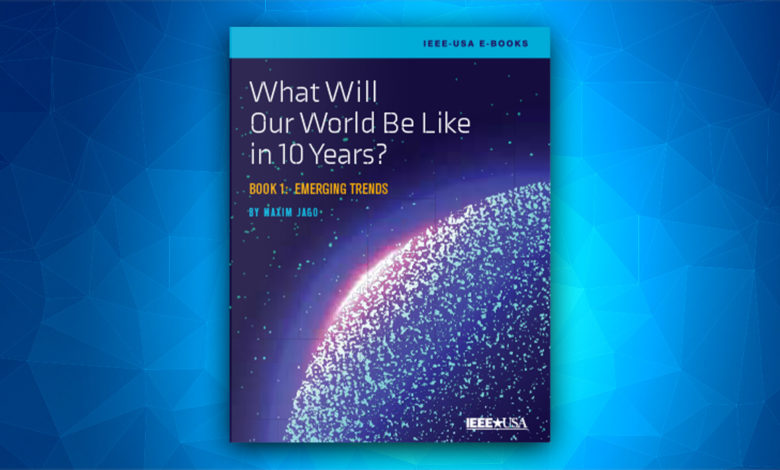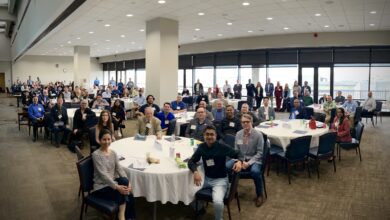
“We are all in the gutter,” wrote Oscar Wilde, “but some of us are looking at the stars.”
That a futurist — one who systematically explores possibilities about the future — would make this celebrated quote one of his favorite mottos may not be quite what you would expect. But futurist, award-winning filmmaker and media technology authority Maxim Jago is not quite what you’d expect either.
The work of this British-born futurist spans multiple industries — from Artificial Intelligence (A.I.) and extended reality (XR) — to education and the creative arts. The author of numerous books and online courses, film schools use his volume on video editing with Adobe Premiere Pro as their standard text. In addition, millions of people worldwide have viewed his more than 1,800 online tutorials that teach the subject.
Now, IEEE members and other technical professionals need look no further for reliable predictions about how social developments will likely affect contemporary technologies over the next decade.
What Will Our World Be Like in Ten Years? Book 1: Emerging Trends is the first in a series of five e-books that Jago is writing especially for IEEE-USA. In the first book, Emerging Trends, Jago offers his views about 31 developments that he defines as “impactful for several important facets of our lives in the next ten years.” Then, he pinpoints as themes those that are “the most compelling and worthy of attention.”
The list includes such societal issues as socio-political uncertainty, the rich-poor divide and spirituality. He proposes an optimistic-realistic outlook, with benefits coming from “autonomous robotics, deep learning, socio-economic changes resulting from blockchain, wide-area crowd funding, and environmental controls leading to a new era of potential.”
It’s safe to predict that his observations and predictions should be more than enough to kindle — if not ignite — engineers’ curiosity and imaginations, as well as other technical professionals.
Jago notes blockchain is already a part of our business landscape; and he predicts that over the next decade, everyday transactions and management systems will integrate it. “Currently, the tone of the debate around blockchain technology is: “Why should we use it,” he writes. “Over the next ten years, that is likely to transition to: “Why not use it?”
Jago is tremendously enthusiastic about AI. He affirms, “AI’s importance and development cannot be overstated.” He observes that systems already in place demonstrate they can manage, gauge, remember and value-judge with greater precision and consistency than humans ever could. And Jago foresees increasingly autonomous robotic systems that will depend on AI training. Further, he believes dynamic AI systems that update and retrain themselves will become an ongoing, changing state.
“Natural language interaction with computers is perhaps the most significant of the new technologies that will benefit our species,” Jago adds. He envisions the day when completely non-technical individuals will routinely use computers and hold ordinary conversations with AI systems.
In envisioning the future of robotics, Jago emphasizes his certainty that autonomous vehicles will have a major impact on society. Acknowledging that fully autonomous vehicles — capable of driving anywhere — are not yet viable from a safety standpoint, he nevertheless predicts that autonomy will soon be an option in automobile showrooms.
Jago adds that these vehicles will affect much more than how we get to our destination. He believes that autonomous vehicles will result in quantum societal shifts on everything from individual mobility to emergency medical care, and much more. Jago theorizes that because such vehicles will actually be autonomous robots operating in a human environment, a major cultural shift will result, with significant changes to our attitudes about travel and travel time.
One of Jago’s most provocative and interesting discussions concerns the matter of Privacy. “Over the next ten years,” he writes, we are likely to lose almost all of our privacy; and, in the main, we won’t care.” He likens the trend toward loss of privacy to how ice cream makers market their products, noting, “There is very little positive nutrition in a bowl of ice cream, but knowing it doesn’t stop us from loving it.”
Jago contends that the benefits associated with sharing our information will seem to outweigh the costs, observing that we will enhance so-called “free” services significantly; but to do so, we will have to share our share our browsing habits and favorites. Reassuring those who value their privacy, he predicts that the evidence so far suggests a positive outcome.
“We are likely to develop encryption and security systems in the next ten years that are effectively unhackable,” Jago writes. Moreover, he points out the potential for personal data to be used for the greater good.
“Rather than hemming in users with similar results to their last search, our online platforms have the opportunity to selectively expand our horizons with new ideas and information in exactly the ways we might need,” Jago says.
In Emerging Trends, Jago discusses — in frequently fascinating style — where 27 other trends are going in the coming decade. They include medical developments, sensor technology, safety, military, the environment, the news media and agriculture. Further, given his extensive background in media technology, he presents how he sees trends evolving in sensor technology, XR, gaming, social media and portable computing.
What Will Our World Be Like in Ten Years? Book 1: Emerging Trends is available in the IEEE-USA Shop — free to members. Non-members pay $9.99.
To come — Jago will author four more books for the series — on Artificial Intelligence, Consumer Space, The Internet of Things, and 5G Blockchain.
Helen Horwitz is an award-winning freelance writer who lives in Albuquerque, N.M. She was with IEEE from 1991 through 2011, the first nine as Staff Director, IEEE Corporate Communications.






